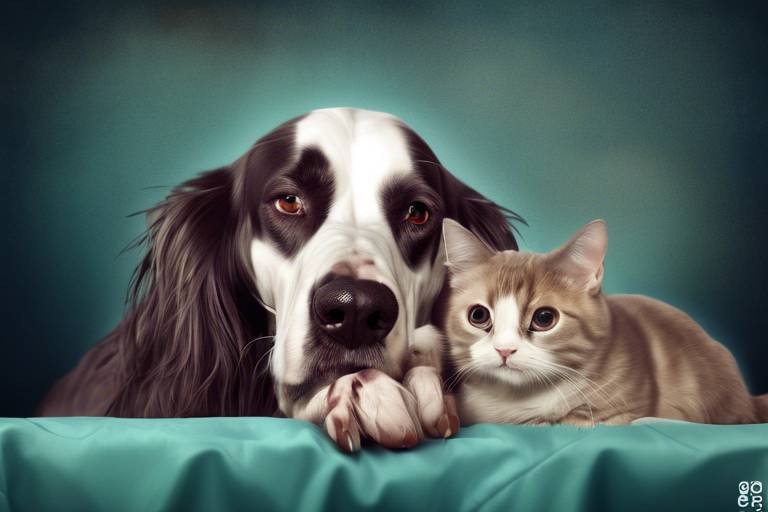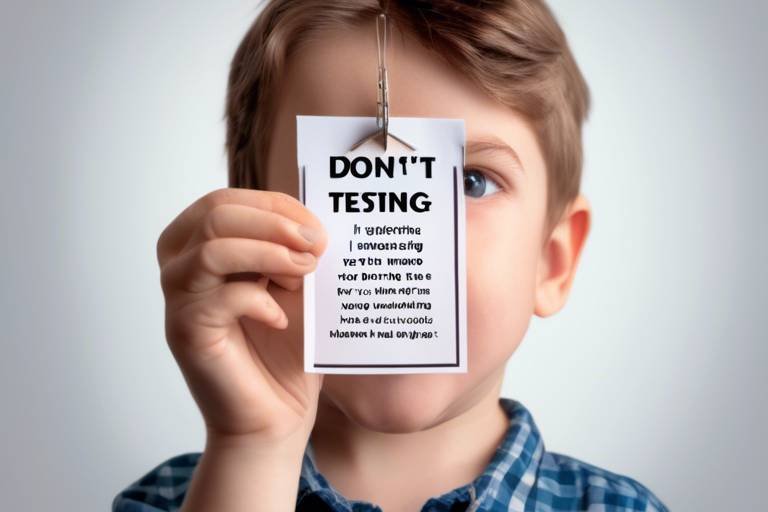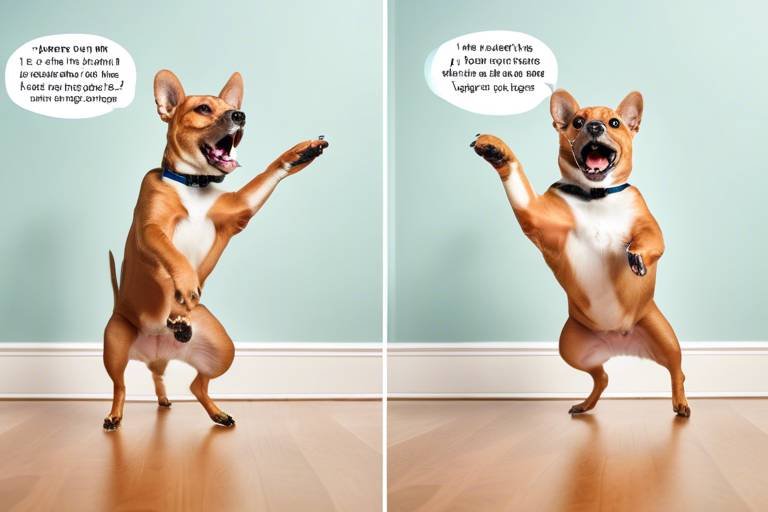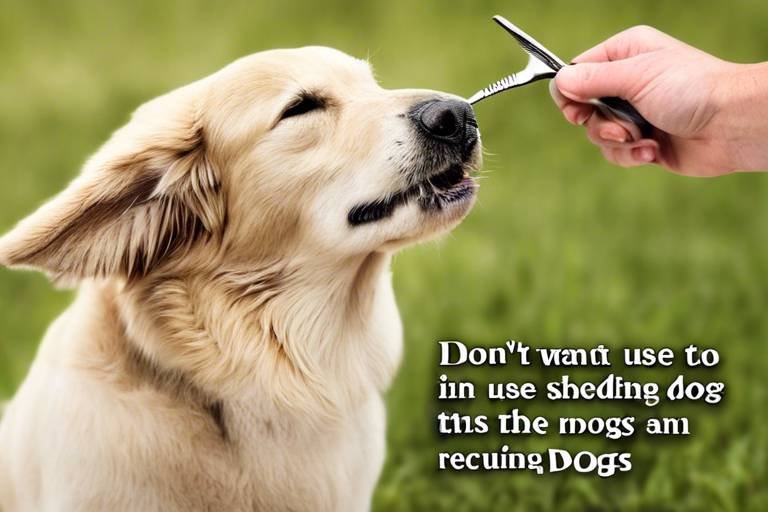Signs of Depression in Pets and How to Help
When we think about our furry friends, their joy and playfulness often come to mind. But what happens when that spark dims? Just like humans, pets can experience depression, and recognizing the signs early can make a world of difference. Whether it's your loyal dog or your aloof cat, understanding their emotional state is crucial for their well-being. In this article, we will explore the signs of depression in pets, the underlying causes, and effective strategies for helping them recover, ensuring they lead happy and healthy lives once again.
Identifying the signs of depression in pets is crucial for timely intervention. Have you noticed your pet acting differently? Common indicators include:
- Changes in Behavior: If your pet is less interactive or seems withdrawn, it could be a sign of depression.
- Altered Appetite: A sudden loss of interest in food or excessive eating can indicate emotional distress.
- Energy Levels: Is your pet sleeping more than usual or showing little enthusiasm for play? This lethargy can be a red flag.
Being observant and aware of these changes can help pet owners take appropriate action before the situation escalates.
Understanding the root causes of depression in pets can aid in prevention. Several factors may contribute to a pet's emotional well-being, including:
- Loss: The death of a companion or owner can leave pets feeling profoundly sad.
- Changes in Environment: Moving homes or introducing new pets can trigger feelings of anxiety.
- Health Issues: Chronic pain or illness can also lead to depression in pets.
By recognizing these factors, you can better support your furry friend during tough times.
The loss of a companion or owner can lead to profound grief in pets. It's heart-wrenching to see your beloved pet mourn, but recognizing their mourning behavior is essential in providing the necessary support during this difficult time. Grieving pets may exhibit:
- Lethargy: A noticeable drop in energy levels.
- Decreased Appetite: Refusing to eat or showing little interest in food.
- Searching Behavior: Looking for the lost companion or seeming to wait by the door.
Understanding these symptoms can help owners provide comfort and reassurance to their beloved companions, allowing them to feel less alone in their grief.
So, how can you help your grieving pet? Offering extra attention is key. Spend more time with them, engage in gentle play, and maintain their routines. Pets thrive on consistency, so keeping their daily schedule as normal as possible can provide a sense of security. Additionally, consider providing comforting items, such as a favorite toy or blanket, that remind them of their lost companion. Creating a supportive environment is vital for their emotional recovery.
Pets are surprisingly sensitive to changes in their surroundings. Whether it's moving to a new home or introducing a new pet into the household, these shifts can trigger feelings of anxiety and depression. It's essential for owners to be mindful of their pets' emotional states during these transitions. Watch for signs of stress, such as excessive barking, hiding, or destructive behavior, and be prepared to offer extra love and reassurance.
Implementing effective strategies can significantly improve a pet's mood. Simple actions can work wonders, such as:
- Increased Playtime: Engaging your pet in regular play can lift their spirits and strengthen your bond.
- Social Interaction: Encourage interaction with other pets and people to alleviate feelings of loneliness.
- Veterinary Consultations: If depression persists, consulting a veterinarian is crucial. They can assess the pet's health, recommend treatments, and provide guidance on behavioral therapies to support recovery.
By taking these steps, you can help restore your pet's emotional balance and bring back their joy.
Q: How can I tell if my pet is depressed?
A: Look for signs such as changes in behavior, appetite, and energy levels. If your pet seems withdrawn or less interested in activities they usually enjoy, it may be a sign of depression.
Q: What should I do if my pet shows signs of depression?
A: Start by providing extra attention and maintaining their routine. If symptoms persist, consult a veterinarian for professional advice.
Q: Can pets recover from depression?
A: Yes, with proper support, attention, and sometimes medical intervention, many pets can recover from depression and return to their happy selves.

Recognizing the Signs of Depression
Just like us, our furry friends can experience feelings of sadness and depression. Recognizing the signs of depression in pets is crucial for timely intervention and ensuring their well-being. You might notice that your pet is acting differently than usual, and it’s essential to pay close attention to these changes. Some common indicators that your beloved companion may be feeling down include:
- Changes in Behavior: If your pet is usually playful and suddenly becomes withdrawn, it could be a sign of depression. Look for changes in their interactions with you and other pets.
- Appetite Fluctuations: A depressed pet may either lose interest in food or overeat as a way to cope with their feelings. Keep an eye on their eating habits.
- Energy Level Drops: If your pet is lethargic and seems to lack the energy to engage in their favorite activities, it could indicate emotional distress.
Identifying these signs early can make a world of difference. For instance, if your dog used to greet you at the door with enthusiasm but now barely lifts its head, it might be time to investigate further. It’s important to remember that pets can’t verbally express their feelings, so observing their behavior closely is key. Just like we might feel low during tough times, our pets can feel the weight of their own emotional struggles.
Another important aspect to consider is the context of these changes. If your pet has recently experienced a significant life event, such as the loss of a companion or a move to a new home, these factors can contribute to their emotional state. Being mindful of these situations can help you understand your pet's behavior better. Keep in mind that some pets may show subtle signs of depression, while others may exhibit more pronounced symptoms. Regardless of the severity, taking action early can lead to a more positive outcome.
In conclusion, being vigilant and aware of your pet's behavior is essential in recognizing the signs of depression. If you suspect your furry friend is feeling down, don't hesitate to reach out for help. A little attention and care can go a long way in helping them bounce back to their happy selves!

Common Causes of Pet Depression
Understanding the root causes of depression in pets is essential for prevention and timely intervention. Just like humans, our furry friends can experience emotional turmoil. Various factors can lead to a state of sadness or despair in pets, and recognizing these can help us provide the right support. One of the most significant causes is loss. When a pet loses a companion, whether it's another pet or a beloved owner, the grief can be profound. This loss can manifest in various ways, affecting their overall demeanor.
Another common cause of pet depression is changes in environment. Pets thrive on routine and familiarity. Moving to a new home, introducing a new pet, or even changes in the household dynamics can create feelings of anxiety and uncertainty. Imagine being uprooted from your home; it can be disorienting and stressful. Pets experience this too, and their emotional health can suffer as a result.
Health issues can also play a significant role in a pet's emotional state. Chronic pain or illness can lead to a noticeable change in behavior and mood. When pets are not feeling well, they may withdraw, lose interest in activities they once loved, or exhibit changes in appetite. It's essential to pay attention to these signs, as they can indicate underlying health problems that require veterinary attention.
In addition to these factors, lack of social interaction can contribute to depression in pets. Animals are social creatures, and when they are isolated or do not have enough interaction with humans or other animals, they may become lonely and depressed. This is particularly true for pets that have been used to companionship and then find themselves alone for extended periods.
To summarize, the common causes of pet depression can be categorized as follows:
- Loss: Grief from losing a companion or owner.
- Environmental Changes: Moving, new pets, or alterations in household dynamics.
- Health Issues: Chronic pain or illness affecting mood and behavior.
- Lack of Social Interaction: Isolation leading to loneliness and sadness.
By recognizing these causes, pet owners can take proactive steps to support their furry friends. Whether it’s providing extra love and attention during times of loss or ensuring they have a stable and engaging environment, understanding these factors can make a significant difference in a pet's emotional well-being.
Impact of Loss on Pets
When we think about loss, we often imagine the profound sadness it brings to humans. However, our furry companions can experience grief just as deeply. The impact of losing a beloved owner or another pet can be devastating for animals, leading them to exhibit a range of emotional and behavioral changes. Just as humans may withdraw or feel lost after a significant loss, pets can also display similar signs. It's essential for pet owners to recognize these behaviors and respond with compassion and understanding.
Pets are creatures of habit, and they thrive on routine and companionship. When a significant figure in their life is suddenly absent, it can disrupt their world entirely. For instance, a dog that used to eagerly await their owner's return may now sit by the door, waiting in vain. This waiting behavior is a clear indication of their emotional state. They are not just missing the physical presence; they are mourning the bond that was shared. Recognizing these signs is crucial for pet owners who want to provide the necessary support during such a challenging time.
Additionally, the grieving process in pets can manifest in various ways, which may include:
- Lethargy: Pets may become less active, preferring to sleep or stay in one place.
- Decreased Appetite: A pet might lose interest in food, leading to weight loss and health issues.
- Searching Behavior: Pets may roam the house or yard, looking for their lost companion.
Understanding these symptoms can help owners provide comfort. Just as humans benefit from talking about their feelings, pets also need reassurance. A gentle touch, soothing words, and extra attention can go a long way in helping them feel secure again. It's vital to create a supportive environment where pets can express their grief without feeling isolated.
Moreover, it's important to remember that every pet grieves differently. Some may bounce back quickly, while others might take longer to adjust. Patience is key. By maintaining routines and offering comfort, pet owners can help their furry friends navigate through their grief. In this way, the bond between pet and owner can become even stronger, as they support each other through the healing process.
In summary, the impact of loss on pets is significant and requires attention and understanding from their owners. Recognizing the signs of grief and providing the necessary support can help pets heal, allowing them to find joy in their lives once again.
- How can I tell if my pet is grieving? Look for changes in behavior such as lethargy, decreased appetite, and searching for their lost companion.
- What should I do if my pet is showing signs of depression? Offer extra attention, maintain routines, and consult a veterinarian if symptoms persist.
- Can pets recover from grief? Yes, with time, patience, and support, most pets can adjust and find happiness again.
Symptoms of Grief in Pets
When a beloved pet experiences the loss of a companion or a significant person in their life, it can be heart-wrenching to witness their struggle. Just like humans, pets can exhibit a range of emotional responses, and recognizing these symptoms of grief is essential for providing the support they need. One of the most noticeable signs is lethargy. You may find your pet curled up in their favorite spot, seemingly uninterested in activities they once loved. This lack of energy can be alarming, as it often indicates that they are feeling down.
Another common symptom is a decreased appetite. If your pet suddenly turns their nose up at their favorite treats or meals, it could be a sign that they are mourning. Just as we might lose our appetite when sad, pets can do the same. Alongside these changes, you might also notice a shift in their behavior, such as increased vocalization or, conversely, a tendency to retreat and hide. This can be particularly concerning if your pet is usually social and playful.
Additionally, pets may engage in searching behavior. You might catch your dog wandering around the house or your cat sitting by the door, seemingly waiting for their lost friend to return. This behavior is a clear indication that they are trying to make sense of their loss. It’s essential to remember that these symptoms can vary widely among different pets. Some may become clingy and seek more attention, while others might prefer solitude.
Understanding these symptoms is crucial, as it allows you to provide the necessary comfort and reassurance during this tough time. Here’s a quick overview of the symptoms to watch for:
| Symptom | Description |
|---|---|
| Lethargy | Reduced energy levels; less interest in play or activities. |
| Decreased Appetite | Loss of interest in food or treats. |
| Increased Vocalization | More barking, meowing, or whining than usual. |
| Searching Behavior | Wandering around the home looking for the lost companion. |
| Clinginess or Withdrawal | Seeking more attention or isolating themselves from family. |
By being aware of these symptoms, you can take proactive steps to support your grieving pet. Providing them with extra love, maintaining their routines, and offering comforting items can make a world of difference. Remember, just like us, pets need time to heal, and your understanding can help them navigate their grief more comfortably.
How to Support a Grieving Pet
Supporting a grieving pet requires a delicate balance of empathy and understanding. Just like humans, pets experience loss and can feel profound sadness when they lose a companion or a beloved owner. One of the most effective ways to help your furry friend during this tough time is to provide extra attention. This can be as simple as spending more time cuddling on the couch or engaging in their favorite activities. The warmth of your presence can be incredibly comforting, reminding them that they are not alone in their grief.
Maintaining a consistent routine is another crucial aspect of supporting a grieving pet. Animals thrive on predictability, and a sudden change in their daily schedule can exacerbate their feelings of anxiety. Try to keep feeding times, walks, and play sessions as regular as possible. This sense of normalcy can create a safe space for your pet, helping them to gradually adjust to their loss.
Additionally, consider providing comforting items that can help ease their emotional pain. This could be a favorite toy, a blanket, or even an item that belonged to their late companion. The familiar scent can be soothing and provide a sense of security. You might also want to explore the idea of creating a memorial for the lost pet. This could be as simple as a photo album or a special place in your home where you can remember them together. Such gestures can help both you and your pet process the grief.
Another effective strategy is to encourage social interaction. Pets are social creatures, and engaging them with other animals or people can help alleviate feelings of loneliness. If your pet is open to it, consider arranging playdates with other friendly pets. This interaction can provide a much-needed distraction and even help them form new bonds.
Lastly, don’t hesitate to seek professional help if you feel your pet's grief is overwhelming. A veterinarian or an animal behaviorist can provide valuable insights and recommend therapies that can aid in their emotional recovery. Remember, your pet relies on you for support, and taking proactive steps can make a significant difference in their healing journey.
- How long does it take for a pet to grieve? - The grieving process varies for each pet. Some may recover in a few weeks, while others might take several months. It's essential to be patient and supportive during this time.
- Can pets experience depression after losing a companion? - Yes, pets can experience depression, showing signs such as lethargy, loss of appetite, and changes in behavior. It's crucial to recognize these signs early.
- What should I do if my pet refuses to eat? - If your pet is refusing food, it could be a sign of depression or health issues. Consult your veterinarian to rule out any underlying medical conditions.
- Is it okay to get another pet while my grieving pet is still mourning? - It's important to consider your grieving pet's emotional state before introducing a new companion. Allow them adequate time to adjust to their loss first.
Environmental Changes and Their Effects
Just like humans, pets are incredibly sensitive to their surroundings. When we think about moving to a new home or introducing a new furry friend into the household, it’s easy to overlook how these changes can affect our pets emotionally. Imagine being uprooted from your familiar environment—your cozy bed, favorite sunny spot, and the comforting sounds of home. For pets, this transition can feel overwhelming, leading to feelings of anxiety and even depression.
When a pet experiences significant environmental changes, their routine is disrupted. Pets thrive on routine and familiarity, and any alteration can lead to confusion and stress. For instance, if you move to a new house, your pet may not only miss the old place but also struggle to adjust to the new smells, sounds, and sights. This can manifest in various ways, including:
- Increased Anxiety: Pets may become more anxious, exhibiting behaviors such as excessive barking, whining, or hiding.
- Loss of Appetite: Changes in environment can lead to decreased interest in food, as pets might feel unsettled.
- Destructive Behavior: To cope with stress, some pets may resort to chewing furniture or scratching at doors.
Moreover, introducing new pets can also stir up emotions. A once stable environment can suddenly feel competitive or threatening. Pets may feel they need to establish their territory, leading to aggression or withdrawal. It’s crucial for pet owners to recognize these reactions and respond with patience and understanding.
To help pets cope with these environmental changes, maintaining a sense of routine is essential. Here are a few strategies that can ease the transition:
- Keep Consistent Routines: Try to stick to regular feeding and walking times to provide a sense of stability.
- Provide Safe Spaces: Create comfortable areas where your pet can retreat when feeling overwhelmed, filled with their favorite toys and blankets.
- Gradual Introductions: If bringing in a new pet, introduce them slowly to minimize stress and allow for acclimatization.
By understanding the impact of environmental changes on our pets, we can take proactive steps to help them adjust and thrive. Remember, our furry friends rely on us to create a safe and loving environment, especially during times of transition.
Q: How can I tell if my pet is depressed due to environmental changes?
A: Look for signs such as changes in appetite, increased hiding, excessive barking, or destructive behavior. If your pet seems withdrawn or anxious, it might be a sign of depression.
Q: What should I do if my pet is showing signs of stress after moving?
A: Maintain their routine as much as possible, provide safe spaces, and give them extra attention. Gradually introduce them to new areas of the home.
Q: Can pets adjust to new environments over time?
A: Yes, with time and patience, most pets can adapt to new surroundings. Consistency and reassurance from their owners play a crucial role in this adjustment.

Effective Strategies for Helping Depressed Pets
When it comes to lifting the spirits of our furry friends, understanding their needs is paramount. Just like us, pets can experience emotional lows, and it’s essential to take proactive steps to help them bounce back. One of the most effective strategies is to increase playtime. Engaging in fun activities not only stimulates their mind but also fosters a deeper bond between you and your pet. Think of it as a mini workout; it boosts their mood and helps release those feel-good endorphins. Imagine your pet’s wagging tail or purring as a sign of gratitude for the attention you’re giving them.
Another vital aspect to consider is social interaction. Pets, especially dogs, are social creatures that thrive on companionship. Organizing playdates with other pets or simply spending more quality time with them can work wonders. Just picture your dog’s joy when they see their best friend at the park! It’s not just about physical play; it’s about emotional engagement. Cats, too, benefit from socialization, so don’t forget to include them in the fun, perhaps with interactive toys or a cozy spot by your side.
Moreover, maintaining a routine can provide a sense of stability that helps alleviate anxiety and depression in pets. Animals thrive on predictability, so try to keep feeding, walking, and playtimes consistent. This routine can be a comforting anchor in their day, making them feel secure and loved. If you’ve recently moved or made significant changes in your household, be patient. It may take time for your pet to adjust, so give them the space they need while gradually introducing new elements into their lives.
Lastly, don’t hesitate to consult a veterinarian if your pet’s depression seems persistent. They can perform a thorough health check to rule out any underlying medical issues that might be contributing to your pet’s emotional state. Additionally, veterinarians can recommend behavioral therapies or medications if necessary. It’s like having a trusted guide on your journey to restoring your pet’s happiness. Remember, seeking professional help is not a sign of failure; it’s a step towards ensuring your pet receives the best care possible.
- How can I tell if my pet is depressed? Look for signs such as changes in appetite, energy levels, and behavior. If they seem withdrawn or less active than usual, it may be time to investigate further.
- What should I do if my pet refuses to play? Try introducing new toys or activities, but also consider their emotional state. They may need more time or a gentle nudge to get back into play.
- Can diet affect my pet's mood? Absolutely! A balanced diet rich in nutrients can influence your pet's overall well-being. Consult your vet for dietary recommendations that support mental health.
- Is it normal for pets to grieve? Yes, pets can experience grief just like humans. It's essential to provide them with extra love and support during these times.
Enhancing Social Interaction
One of the most effective ways to lift your pet's spirits is by enhancing their social interaction. Just like humans, pets thrive on connection and companionship. Imagine feeling isolated in a room full of people; that’s how your furry friend might feel if they’re not getting enough social engagement. It’s essential to recognize that pets, whether they’re dogs, cats, or even smaller animals, have social needs that must be met for their emotional well-being.
Engaging in regular playdates with other pets can significantly improve your pet's mood. This interaction not only stimulates them physically but also mentally, helping to alleviate feelings of loneliness and depression. Think of it as a mini-party for your pet! When they get to romp around with their pals, they release pent-up energy and engage in natural behaviors that are crucial for their happiness. You might consider organizing playdates with friends who have pets, or even joining local pet groups or classes where your pet can meet new friends.
Moreover, incorporating more family members into playtime can also enhance your pet's social life. Whether it’s tossing a ball in the backyard or simply cuddling on the couch, these moments of interaction can create a sense of belonging for your pet. It's like inviting them to be part of the family activities, which reinforces their bond with you and makes them feel loved and secure.
Sometimes, pets can also benefit from structured socialization activities. Consider enrolling your dog in obedience classes or agility training. Not only do these activities provide mental stimulation, but they also allow your pet to interact with both humans and other dogs in a controlled environment. For cats, setting up a play area with interactive toys or even a cat tree can encourage them to engage more with their surroundings and family members.
In addition to physical play, don't underestimate the power of affectionate interaction. Simple gestures like petting, brushing, or just sitting together can significantly enhance your pet's emotional state. It’s like giving them a warm hug that reassures them they are loved and cared for. The more you engage with your pet, the more secure they will feel, which can help combat feelings of depression.
Lastly, if you notice that your pet is still struggling despite your efforts to increase social interaction, it may be beneficial to consult with a veterinarian or a pet behaviorist. They can provide tailored advice and strategies to help your pet navigate their emotional challenges. Remember, taking steps to enhance your pet’s social life is not just about keeping them entertained; it’s about fostering a happy and healthy life for them!
- How can I tell if my pet is depressed? Look for signs such as changes in appetite, lethargy, or loss of interest in activities they once enjoyed.
- What should I do if my pet is grieving? Offer extra comfort, maintain routines, and be patient as they process their emotions.
- Can pets benefit from socialization with other animals? Absolutely! Socialization can help alleviate feelings of loneliness and improve their overall mood.
- When should I consult a veterinarian? If your pet's depression persists or worsens, it’s essential to seek professional help for proper assessment and guidance.
Consulting a Veterinarian
When a pet shows signs of prolonged depression, it is essential to consult a veterinarian. Just like humans, pets can experience emotional distress that may stem from underlying health issues. A veterinarian can perform a thorough examination to rule out any physical ailments that could be contributing to your pet's mood changes. This step is crucial because sometimes, what appears to be depression might actually be a symptom of pain or illness. For instance, conditions like arthritis, dental disease, or even hormonal imbalances can lead to lethargy and changes in appetite, mimicking signs of depression.
Furthermore, veterinarians can provide invaluable insights into your pet's behavior. They can help you understand whether the changes you observe are part of a normal behavioral spectrum or if they indicate a more serious issue. In some cases, your veterinarian may recommend behavioral therapies or medications that can significantly improve your pet's emotional state. It’s important to approach this with an open mind and consider all options that could lead to your furry friend’s well-being.
In addition to physical examinations, many veterinarians specialize in animal behavior and can offer tailored advice based on your pet’s specific situation. They might suggest techniques for enriching your pet's environment or increasing socialization, which can be beneficial in combating feelings of loneliness and depression. Remember, your veterinarian is not just there for the occasional check-up; they are a vital partner in your pet's emotional and physical health.
To make the most of your veterinary visit, consider preparing a list of observations about your pet's behavior and any changes you've noticed. This information can assist the veterinarian in making a more accurate assessment. Here’s a quick checklist of things to note:
- Changes in appetite
- Alterations in energy levels
- Any unusual behaviors, such as hiding or excessive vocalization
- Changes in sleeping patterns
By providing this detailed information, you can help ensure that your pet receives the most effective care possible. Ultimately, consulting a veterinarian is a proactive step in addressing your pet’s mental health and ensuring they lead a happy, fulfilling life.
Q: How do I know if my pet is depressed?
A: Look for signs such as lethargy, changes in appetite, withdrawal from social interactions, and alterations in sleeping patterns. If these symptoms persist, it’s best to consult a veterinarian.
Q: Can depression in pets be treated?
A: Yes, depression in pets can often be treated through behavioral therapy, medication, and environmental enrichment. A veterinarian can recommend the best course of action based on your pet's specific needs.
Q: How can I help my pet feel better at home?
A: Providing a stable routine, engaging in interactive play, and ensuring plenty of social interaction can help improve your pet's mood. Additionally, offering comforting items like their favorite toys can provide emotional support.
Frequently Asked Questions
-
What are the common signs of depression in pets?
Common signs of depression in pets include changes in behavior, such as withdrawal from social interactions, decreased appetite, and lethargy. You might notice your furry friend sleeping more than usual or showing disinterest in activities they once loved. If your pet seems unusually quiet or is hiding away, these could be red flags that something is off.
-
What causes depression in pets?
Depression in pets can stem from various factors, including the loss of a companion, changes in their environment, or underlying health issues. Just like us, pets can feel the weight of grief or anxiety when their routine is disrupted or when they experience loss. Understanding these triggers is crucial for addressing their emotional needs.
-
How can I help my grieving pet?
Supporting a grieving pet requires a gentle approach. Offer them extra attention and affection, maintain their daily routines, and provide comforting items, like their favorite toys or blankets. Sometimes, just being there for them can make a world of difference, helping them feel secure during a tough time.
-
Are environmental changes a factor in pet depression?
Absolutely! Pets are highly sensitive to their surroundings. Moving to a new home, introducing new pets, or even changes in family dynamics can lead to feelings of anxiety and depression. It's important for pet owners to be aware of how these shifts might affect their furry friends and to provide reassurance during the transition.
-
What strategies can I use to help my depressed pet?
There are several effective strategies you can employ to help your pet feel better. Increasing playtime, providing social interactions with other pets, and consulting a veterinarian for professional advice are all great steps. Regular exercise and engaging activities can also uplift their spirits and restore their emotional balance.
-
When should I consult a veterinarian about my pet's depression?
If your pet's depression persists despite your efforts, it's time to consult a veterinarian. They can conduct a thorough health assessment, recommend treatments, and suggest behavioral therapies tailored to your pet's needs. Remember, it's always better to seek professional guidance if you're concerned about your pet's well-being.



















